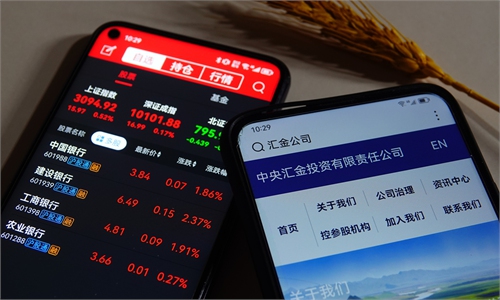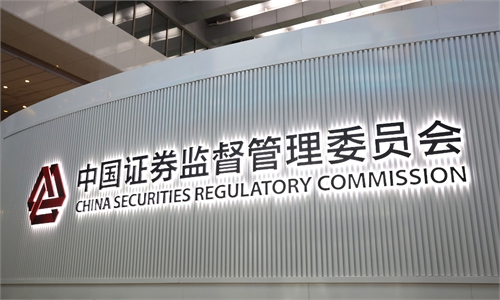Growth, fiscal policies instill positive factors to A-share market despite external uncertainty

Illustration: Chen Xia/Global Times
China's stock market, bolstered by the government's extra fiscal spending and other stimulus plans to strengthen economy, recorded a significant rally on Friday, with the benchmark Shanghai composite stock index rising 29.49 points, or 0.99 percent, the largest single-day rise in more than a month. Investors from home and abroad were quick to snap up Chinese equities, as Friday's trading volume in the mainland market exceeded 960 billion yuan ($131.2 billion).After hitting its lowest point in the last 11 months, the valuations of Chinese equities are now at a comfortable level and look increasingly attractive when compared to developed markets. The central government's latest decision to ramp up national debt level by issuing more treasury notes is expected to accelerate economic recovery, which will act as a positive trigger for the capital market.
As known to all, the performance of equities is a direct indicator linked to overall economic sentiment. As the stock index rises and falls, so too does the sentiment in the economy. Equities affect the GDP primarily by influencing financial conditions and consumer confidence. When stocks begin to rise - or enter a bull market - there tends to be a great deal of optimism surrounding the economy.
Conversely, in a bear market when stock prices fall, consumers and companies have less wealth and the optimism is smothered. In China, there are more than 219 million individual stock investors, according to media reports. As their stock investments suffer, they will likely pull back on spending.
So, it is of great importance for governments all over the world to maintain a stable and healthy stock market. However, the cascades of global political and economic turbulences in the past couple of years have impacted investor sentiment in China, causing the Shanghai composite index to drop to as lower as 2,923 points earlier this month.
Market analysts believe that investors will return and purchase Chinese assets, as the world's second largest economy has regained impetus to expand. In the third quarter this year, China's GDP grew by 4.9 percent year-on-year, much higher than the broadly estimated 4.4 percent. For the first nine months, the economy expanded by an impressive 5.2 percent.
However, in light of the phenomenon of "higher for longer" interest rates in the US and Europe, and the need for more monetary policy easing in China, the pressure for capital outflows is likely to persist in the short term, which may pose as a major destabilizing factor for the capital market.
To inject momentum into market trading, Central Huijin Investment Fund, an arm of China Investment Corp, has recently jumped to the stock market by increasing its holdings of Chinese equities that will likely help jumpstart the A-share market, which was put on display on Thursday and Friday.
The central government's resolve to increase fiscal stimulus by issuing an additional one trillion yuan in treasury bonds to shore up the economy, and Central Huijin's move to buy equities on the secondary market have reinforced the policy signal of reinvigorating the stock market, which could support a sustainable market rally in the short to medium run. Following the one trillion yuan special bonds sale, the country's fiscal deficit ratio in 2023 will grow from 3 percent to 3.8 percent of the GDP.
China's equities are currently trading at the lower end of historical valuations. But the country's recovery in corporate earnings is well on track with return on equity (ROE) expected to improve as the economy continues to strengthen, market observers say.
Triggered by the additional one-trillion-yuan special bonds sale and Central Huijin's step to purchase equities, China's A-share market rallied strongly over the past five trading sessions. The benchmark Shanghai composite stock index climbed up by more than 3.2 percent last week.
In the second half of 2023 and also 2024, China's growth impulse is anticipated to be tilted toward expanding investment and ratcheting up home consumption, buoyed by strong government and corporate investments into new technologies including semiconductors, robotics, big data and AI, solar and wind farms and other forms of green energy, as well as the ongoing explosive production and heated sale of electric vehicles.
At the same time, the country's low interest rate environment is estimated to remain in place. The country has sustained a low inflation environment for the past three years, which has been kept at a low single-digit range of below two percent. The central bank's reserve requirement ratio has been on a downward trend too, with the aim to provide adequate liquidity. And the loan prime rate (LPR) has been maintained lower, reducing borrowing costs for broad businesses and individuals, which will fuel up credit growth.
With regard to the much scrutinized property sector, the government has rolled out a raft of supportive policies since late 2022, including policies backing up quality developers and the easing of home purchase restrictions in the tier-1 and tier-2 megacities and sticking to lower mortgage rates that favor home buyers. The policy easing is expected to continue in the coming months in the government's attempt to bolster economic growth.
In a brief disclosure, Central Huijin said that it ramped up its holdings in the country's four largest commercial banks and plans to further boost its portfolio in the lenders in the coming months. The market has since responded favorably. To further shore up market expectations, Central Huijin and other funds should keep on purchasing selected shares to help establish a buttress for the market.
Now, the US Federal Reserve has signaled that high interest rates are likely to become the norm, which caused the yield of the 10-year benchmark US Treasury notes to reach 5 percent in early October, the highest in 16 years. The prolonged high interest rates in the US have put mounting pressure on other markets, causing capital outflows from emerging economies. Facing elevated rates abroad, China could take bolder reform measures to stop the outflow of funds and maintain stability of domestic capital market.
The author is an editor with the Global Times. bizopinion@globaltimes.com.cn



